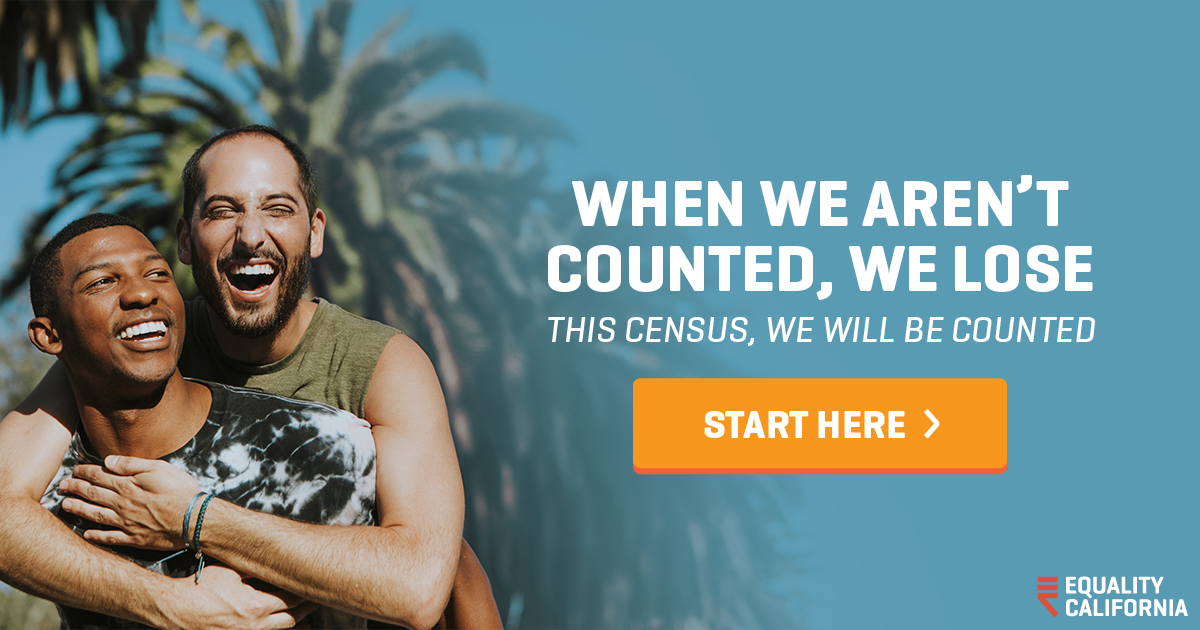
Ahead of the 2020 Census, Equality California has launched an outreach campaign on Facebook encouraging the LGBTQ community to answer the Census, which is crucial for funding various programs that help queer people and Congressional representation. Photo: Equality California.
The 2020 Census is a “fight for the future” of the LGBT community, Equality California said.
“The 2020 Census is nothing less than a fight for our future — a future that values diversity and invests in the communities that need it most,” Rick Zbur, executive director of Equality California, said in a statement. “Too often, California’s diverse LGBTQ community is undercounted — which denies us power, representation and funding for programs that the most vulnerable members of our community need to survive.”
In mid-March, homes across the country will start receiving the 2020 Census. People can respond online or by phone, or mail back the questionnaire. By April 1, recognized nationwide as Census Day, every home should have received a 2020 Census.
LGBTQ community vulnerable
The LGBTQ community is one of the hardest-to-count populations, the U.S. Census Bureau has said, and California is home to the nation’s largest LGBTQ population.
Members of the LGBTQ community who belong to multiple hard-to-count populations — people experiencing homelessness, immigrants, people of color, renters and low-income people — are particularly vulnerable to being undercounted.
What’s at stake?
LGBTQ families participate in disproportionate numbers in social safety net programs such as Medicaid and the Supplemental Nutrition Assistance Program, also known as SNAP. An undercount of LGBTQ Californians would result in less federal funding for LGBTQ families who depend on these programs to survive.
- 22.7% of LGBTQ families receive SNAP nationally compared to 9.7% of non-LGBTQ families.
- 20.9% of LGBTQ families participate in Medicaid nationally compared to 12.9% of non-LGBTQ families.
- California receives more than $115 billion per year for education, healthcare, housing, and other social net programs.
- California is expected to lose federal funding of approximately $2,000 per person, per year, for ten years, for every person who is missed in the 2020 Census.
What is the Census?
Ahead of the 2020 Census, Equality California’s education arm, Equality California Institute, has launched a $1 million outreach campaign focused on queer people.
The Equality California campaign will explain why the 2020 Census is vital to the LGBTQ community and encourage participation.
The U.S. Census, conducted every 10 years by the federal government, attempts to count every living person in the nation. The Census is a short questionnaire that collects basic demographic information about each person, such as race, gender, age, ethnicity, and city of residency.
Same-sex couples
The Trump-Pence Administration killed plans to include questions about sexual orientation and gender identity in the 2020 census, but, for the first time, the Census will include a question allowing same-sex couples to identify as either spouses or unmarried partners.
Congressional representation
Census data results are used to draw Congressional lines and state districts and determine how much funding states will receive for a variety of social services as well as schools and roads, among other things.
“What’s at stake in the 2020 Census is representation in Congress,” said Beatriz E.Valenzuela, a spokeswoman with Equality California. “A lot of anti-LGBTQ rhetoric is happening in Congress, and the Trump-Pence Administration has been systematically attacking the LGBTQ community. To not be counted in the 2020 Census means you are giving away your voice.
“Having an accurate count of every living person in the country helps draw Congressional lines, which can lead to better representation in government,” Valenzuela said.
Equality California’s outreach campaign has several components:
- Digital advertising on Facebook and the LGBTQ dating app Grindr targeting LGBTQ people in California’s hardest-to-count neighborhoods
- Peer-to-peer text messaging, which the US Census Bureau recently touted as the most effective way to engage with hard-to-count populations, encouraging self-response, providing reminders offering information on how to find local census kiosks
- 10 regional LGBTQ Census assistance kiosks, in traditionally hard-to-count locations throughout the state: Los Angeles, San Francisco, San Diego, Sacramento, Bakersfield, Visalia, Napa, Santa Rosa, Ventura County, and Santa Cruz. Some locations will specifically serve bilingual LGBTQ populations
- Engage with community members at local Pride celebrations and other LGBTQ community events across the state
- Door-to-door canvassing in Los Angeles County, historically the hardest to count county in the nation
- Collaborate with local partner organizations: Latino Equality Alliance, The Gender Health Center, The LGBT Asylum Project, The SOURCE LGBT+ Center, The Dolores Huerta Foundation, Arming Minorities Against Addiction and Disease Institute, and San Diego LGBT Pride
